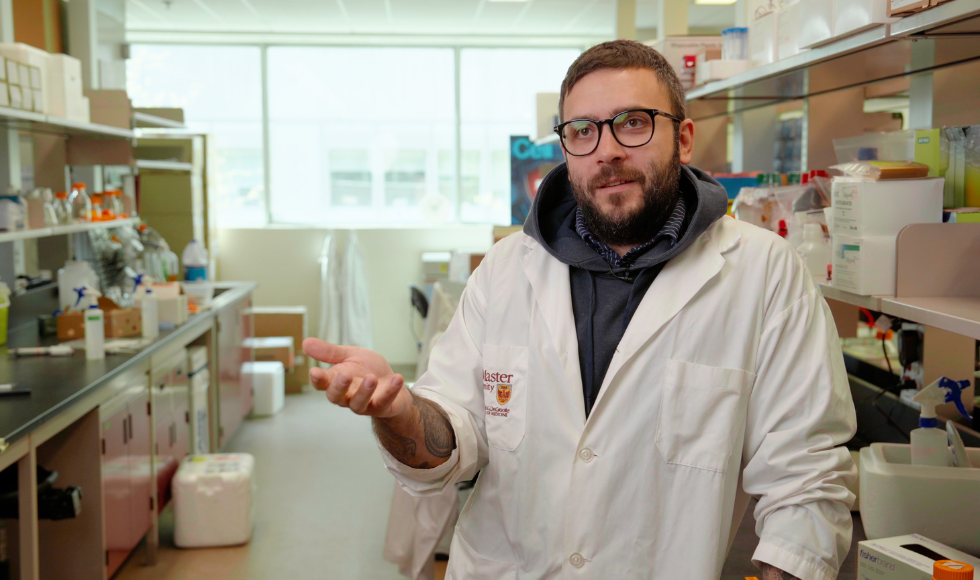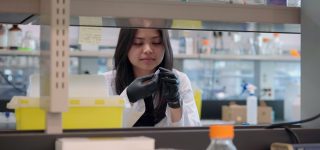Scientists use AI to find promising new antibiotic to fight evasive hospital superbug

Lead author Jonathan Stokes, assistant professor in the Department of Biochemistry & Biomedical Science. Researchers identified a new antibacterial compound to treat the pathogen Acinetobacter baumannii.
May 25, 2023
Scientists at McMaster University and the Massachusetts Institute of Technology have used artificial intelligence to discover a new antibiotic which could be used to fight a deadly, drug-resistant pathogen that strikes vulnerable hospital patients.
The process they used could also speed the discovery of other antibiotics to treat many other challenging bacteria.
The researchers were responding to the urgent need for new drugs to treat Acinetobacter baumannii, identified by the World Health Organization as one of the world’s most dangerous antibiotic-resistant bacteria. Notoriously difficult to eradicate, A. baumannii can cause pneumonia, meningitis and infect wounds, all of which can lead to death.
A. baumanni is usually found in hospital settings, where it can survive on surfaces for long periods. The pathogen is able to pick up DNA from other species of bacteria in its environment, including antibiotic-resistance genes.
In the study, published today in the journal Nature Chemical Biology, researchers report they used an artificial intelligence algorithm to predict new structural classes of antibacterial molecules, and identified a new antibacterial compound, which they have named abaucin.
In the News
Read more about how researchers in the Stokes Lab are using artificial intelligence to discover new antibiotics in the BBC, The Guardian, CNN, USA Today and the Toronto Star.
Discovering new antibiotics against A. baumannii through conventional screening has been challenging. Traditional methods are time-consuming, costly, and limited in scope.
Modern algorithmic approaches can access hundreds of millions, possibly billions, of molecules with antibacterial properties.
“This work validates the benefits of machine learning in the search for new antibiotics” says Jonathan Stokes, lead author on the paper and an assistant professor in McMaster’s Department of Biomedicine & Biochemistry, who conducted the work with James J. Collins, a professor of medical engineering and science at MIT, and McMaster graduate students Gary Liu and Denise Catacutan.

“Using AI, we can rapidly explore vast regions of chemical space, significantly increasing the chances of discovering fundamentally new antibacterial molecules,” says Stokes, who belongs to McMaster’s Global Nexus School for Pandemic Prevention and Response.
“AI approaches to drug discovery are here to stay and will continue to be refined,” says Collins, Life Sciences faculty lead at the MIT Abdul Latif Jameel Clinic for Machine Learning in Health. “We know algorithmic models work, now it’s a matter of widely adopting these methods to discover new antibiotics more efficiently and less expensively.”
Abaucin is especially promising, the researchers report, because it only targets A. baumannii, a crucial finding which means the pathogen is less likely to rapidly develop drug resistance, and which could lead to more precise and effective treatments.
Most antibiotics are broad spectrum in nature, meaning they kill all bacteria, disrupting the gut microbiome, which opens the door to a host of serious infections, including C difficile.
“We know broad-spectrum antibiotics are suboptimal and that pathogens have the ability to evolve and adjust to every trick we throw at them,” says Stokes. “AI methods afford us the opportunity to vastly increase the rate at which we discover new antibiotics, and we can do it at a reduced cost. This is an important avenue of exploration for new antibiotic drugs.”
The research was funded by the Weston Family Foundation, the David Braley Centre for Antibiotic Discovery, the Audacious Project, the C3.ai Digital Transformation Institute, the Abdul Latif Jameel Clinic for Machine Learning in Health, the DTRA Discovery of Medical Countermeasures Against New and Emerging Threats program, the DARPA Accelerated Molecular Discovery program, the Canadian Institutes of Health Research, Genome Canada, the Faculty of Health Sciences of McMaster University, the Boris Family, a Marshall Scholarship and the Department of Energy Biological and Environmental Research program.


